Related Research Articles
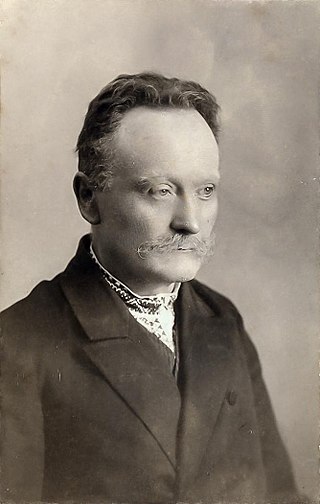
Ivan Yakovych Franko was a Ukrainian poet, writer, social and literary critic, journalist, translator, economist, political activist, doctor of philosophy, ethnographer, and the author of the first detective novels and modern poetry in the Ukrainian language.

Lesya Ukrainka was one of Ukrainian literature's foremost writers, best known for her poems and plays. She was also an active political, civil, and feminist activist.

Ukrainian rock is rock music from Ukraine.

Yurii Ihorovych Andrukhovych is a Ukrainian prose writer, poet, essayist, and translator. His English pen name is Yuri Andrukhovych.
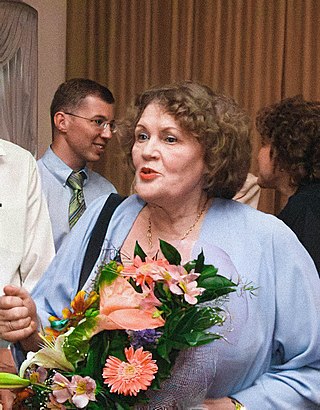
Lina Vasylivna Kostenko is a Ukrainian poet, journalist, writer, publisher, and former Soviet dissident. A founder and leading representative of the Sixtiers poetry movement, Kostenko has been described as one of Ukraine's foremost poets and credited with reviving Ukrainian-language lyric poetry.

Victor Morozov is one of Ukraine's most popular singer-songwriters.
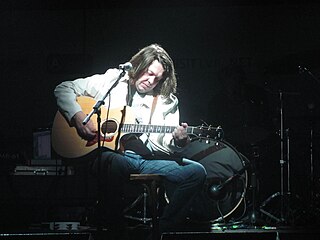
Taras Hryhorovych Chubay, is a Ukrainian musician and poet, singer and composer, leader of the Ukrainian rock band Plach Yeremiyi.

Ivan Ivanovych Trush was a Ukrainian impressionist painter, a master of landscape and portraiture, an art critic, and active community patron of arts in Galicia or Halychyna – a historical region in western Ukraine. He was a son in law of Mykhailo Drahomanov.
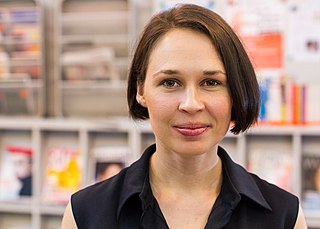
Sofia Yuriyivna Andrukhovych is a Ukrainian writer and translator. She is the wife of Andriy Bondar, Ukrainian writer.
Contemporary Ukrainian literature refers to Ukrainian literature since 1991, the year of both Ukrainian independence and the collapse of the Soviet Union. From that year on, censorship in the Soviet Union ceased to exist and writers were able to break openly with the official socialist realism style of art, music, and literature. Principal changes had taken place in Ukrainian literature already under Perestroika (1985) and especially after the Chernobyl disaster. Some researchers consider that modern Ukrainian literature was born during the 1970s and founded by Soviet dissidents from the sixties generation.
Krytyka is a Ukrainian intellectual monthly/bi-monthly magazine and publishing house dedicated to in-depth analysis of current affairs, culture and book reviews in Ukraine and the region. Krytyka was founded by the Harvard professor of Ukrainian literature, George Grabowicz, in 1997. The magazine is a partner of the Harvard Ukrainian Research Institute, University of St. Gallen, and an exclusive partner of The New York Review of Books in Ukraine. Krytyka receives support from Western and Ukrainian foundations for its various projects, such as Robert Bosch Stiftung. Krytyka is a member of Eurozine, a network of European cultural magazines, and sees its role in mediating between Ukrainian and global intellectual elites. Since 2014, it is also available in English.

Larissa Maria Lubov Zaleska Onyshkevych is a scholar of modern Ukrainian drama and literature. Most of her publications are on modern and postmodern Ukrainian drama, that she discusses in a comparative literature approach. Ukrainian poetry and prose, as well as issues of the Ukrainian language, are also topics of her interest.

The 2018–19 Ukrainian Premier League season was the 28th top-level football club competitions since the fall of the Soviet Union and the eleventh since the establishment of the Ukrainian Premier League.

Stepan Vasylovych Protsiuk is a contemporary Ukrainian novelist, essayist and poet.

Yuriy Romanovych Izdryk is a Ukrainian writer, poet and author of the conceptual magazine project Chetver, also known as Thursday.

The 2019–20 Ukrainian Premier League season was the 29th top-level football club competitions since the fall of the Soviet Union and the 12th since the establishment of the Ukrainian Premier League.
The Ukrainian orthography of 1993 is the fourth edition of the orthography of the Ukrainian language in 1946 and the first to be adopted during the restored independence of Ukraine. This orthography was in force in 1993-2019, during which the orthography commission did not make any changes to it. However, during its reprint, the publisher made minor edits to some examples to eliminate the discrepancy between spelling and orthography vocabulary.
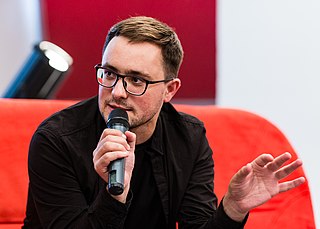
Myroslav Laiuk is a Ukrainian writer.
Anna-Galya Gorbach, née Lutsyak was a Ukrainian literary critic, translator of Ukrainian literature into German, publisher, and public and political figure. Doctor of Philosophy, member of the National Writers' Union of Ukraine (1993), corresponding member of the Shevchenko Scientific Society in Europe, winner of the Ivan Franko literary prize (1994), the Vasyl Stus award of the Ukrainian Association of Independent Creative Intelligentsia (1993), the Triumph Award (2001), the Olena Teliga (2009), Panteleimon Kulish (2019). A wife of a Ukrainian philologist and publisher Oleksa Gorbach. One of the most famous and active personalities in the Ukrainian cultural and intellectual world of the Ukrainian diaspora.

Yuliya Musakovska is a Ukrainian poet and translator. She is the author of poetry collections such as “Exhaling, Inhaling” (2010), “Masks” (2011), “Hunting for Silence” (2014), “Men, Women and Children,” and “The God of Freedom” (2021) as well as two poetry chapbooks released in Poland and Sweden. Her poems have been translated into over thirty languages and widely published across the globe.
References
- ↑ "«Поза очі»: Олександр Ірванець. «Мій хрест». Архів оригіналу за 29 квітня 2014. Процитовано 5 березня 2011". Archived from the original on 2014-04-29. Retrieved 2022-07-29.
- ↑ Ukraine: Everybody's Business
- ↑ Zaxid.net (2007-09-13). "Славнозвісну поезооперу "бубабістів" "Крайслер Імперіал" можна відновити, - Віктор Неборак". ZAXID.NET (in Ukrainian). Retrieved 2023-05-24.
- ↑ "БУ-БА-БУ // Енциклопедія сучасної української літератури". www.ukrlib.com.ua. Retrieved 2023-05-24.
- ↑ Naydan, Michael M. (2006). "Ukrainian Avant-Garde Poetry Today: Bu-Ba-Bu and Others". The Slavic and East European Journal. 50 (3): 452–468. doi:10.2307/20459313. JSTOR 20459313.
- ↑ ""Бу-Ба-Бу". In memoriam | Krytyka, Ігор Пізнюк". Krytyka (in Ukrainian). Retrieved 2023-05-10.
- ↑ "Diasporiana Електронна бібліотека | Shevelov G. Y. The Ukrainian Language in the First Half of he Twentieth Century 1900-1941". diasporiana.org.ua. Retrieved 2023-05-24.
- ↑ Книжкові герої. "Бу-Ба-Бу". Юрій Андрухович, Олександр Іванець, Віктор Неборак , retrieved 2023-05-24
- ↑ Hundorova, Tamara (2019). The Post-Chornobyl Library. Academic Studies Press. ISBN 9781644692394.
- ↑ Andryczyk, Mark (Summer 2002). "Bu-Ba-Bu: Poetry and Performance". Journal of Ukrainian Studies. 27 (1/2): 257–272. ProQuest 209365402.
- ↑ Тимків, Роксана (2015-09-29). "Бу-Ба-Бу, або дружба гартована роками". Фотографії старого Львова (in Ukrainian). Archived from the original on 2015-09-29. Retrieved 2020-06-24.